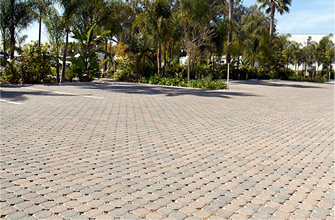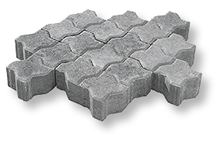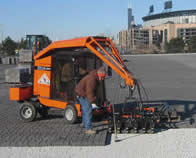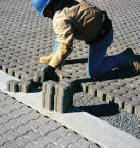Applications
 UNI® Interlocking Concrete Pavers can be used for a wide array of paving applications, including residential, commercial, municipal, and industrial projects such as:
UNI® Interlocking Concrete Pavers can be used for a wide array of paving applications, including residential, commercial, municipal, and industrial projects such as:
- Patios, Walkways, Terraces, Pool Decks and Driveways
- Courtyards, Pedestrian Malls, Plazas and Parks
- Sidewalks, Streets, Medians and Parking Areas
- Roof Plaza Decks, Roof Parking Decks and Roof Ballast
- Farm Roads and Yards, Stable Flooring
- Highway Embankments, Bridge Underpasses and Rest Areas
- Slope and Erosion Control and Marinas
- Storage Depots, Container, Rail, and Bus Terminals
- Airport Maintenance and Hangar Areas
Permeable pavers are not recommended on any site classified as a stormwater hotspot, where there is any risk that stormwater can infiltrate and contaminate groundwater. These include vehicle salvage yards, fueling stations, service and maintenance facilities, outdoor hazardous liquid or material storage areas or unloading facilities, areas where pesticides or fertilizers can drain onto the pavement and other land uses or activities that are prohibited by local governmental agencies.
Quick Links
- Traditional and Permeable Project Galleries
- Traditional Pavers
- Permeable Pavers
- Applications for Concrete Paving Block in the United States Market
- Eco-Stone Family of Permeable Interlocking Concrete Pavers Project Profiles
- Visit our Downloads page to access over 70 items in one place, including design manuals, case studies, articles, research papers and more.

Technical Data
Composition and Materials
All UNI® Interlocking Concrete Traditional and Permeable Paving Stones are comprised of Portland cement, a small amount of water, and fine and coarse aggregates. Colors and admixtures are often added to this "no-slump" or "zero-slump" concrete mix. UNI Manufacturers use state-of-the-art paver production equipment that molds the pavers using extreme pressure and high-frequency vibration. Some manufacturers may utilized special surface finishes such as sand blasting, bush hammering, tumbling, and polishing for a specialty architectural appearance. Consult with your local UNI Manufacturer for availability of specialty finishes.
A white deposit known as efflorescence may sometimes appear on any concrete or masonry product. It does not affect structural integrity and will eventually dissipate over time. Efflorescence is not indicative of a flawed product. It may be removed with specialized cleaners if desired. Your local UNI manufacturer can recommend cleaning products and provide additional information on efflorescence.
Physical Characteristics
 All UNI Concrete Traditional and Permeable Pavers are manufactured to meet or exceed the requirements of ASTM C 936 - Standard Specification For Solid Interlocking Concrete Paving Units. They have a minimum compressive strength of 8,000 psi, a maximum water absorption of 5%, and will meet or exceed freeze-thaw testing per section 8 of ASTM C 67.
All UNI Concrete Traditional and Permeable Pavers are manufactured to meet or exceed the requirements of ASTM C 936 - Standard Specification For Solid Interlocking Concrete Paving Units. They have a minimum compressive strength of 8,000 psi, a maximum water absorption of 5%, and will meet or exceed freeze-thaw testing per section 8 of ASTM C 67.
Most UNI pavers are manufactured with chamfered top edges which minimize chipping and spalling, facilitate the removal of water from the surface of the pavers, and allow for snow removal by plowing. UNI pavers are made with spacer bars on the sides of the unit which automatically provide the minimum joint width when installed. Some UNI pavers, such as Eco-Priora®, Eco-Optiloc® and UNI-Optiloc®, utilize specialized interlocking spacers for added structural stability under vehicular loads. All UNI pavers meet or exceed pedestrian skid and slip resistance guidelines recommended in the Americans with Disabilities Act (ADA), and may be adapted if future changes to the requirements are implemented in the future.
Most UNI Pavers are manufactured in 2 3/8 inch (60 mm) and 3 1/8 inch (80 mm) thicknesses. Consult your local UNI Manufacturer regarding paver colors and blends. These vary across the nation, as manufacturers produce colors that enhance and complement architectural styles for their region.
Application and Design
For pedestrian applications such as walkways, patios, pool decks, courtyards, plazas, and residential driveways 2 3/8 inch (60 mm) thick pavers are usually recommended. Vehicular trafficked pavements typically require the 3 1/8 inch (80 mm) thick paver units. Pavement design varies with climate, available construction materials, design methods, soil conditions, and traffic load. A qualified engineer, architect, and/or landscape architect should be consulted in interlocking concrete paver applications to ensure desired results.
 Interlocking concrete pavements are typically constructed as flexible pavements - with a compacted soil subgrade, compacted aggregate base, and a sand bedding course. The joints between the pavers are filled with sand and the pavers are compacted, creating interlock and transferring loads to the surrounding pavers by shear forces through the joint sand. This enables loads to be spread in a manner similar to asphalt flexible pavements and reduces the stresses on the base and subgrade.
Interlocking concrete pavements are typically constructed as flexible pavements - with a compacted soil subgrade, compacted aggregate base, and a sand bedding course. The joints between the pavers are filled with sand and the pavers are compacted, creating interlock and transferring loads to the surrounding pavers by shear forces through the joint sand. This enables loads to be spread in a manner similar to asphalt flexible pavements and reduces the stresses on the base and subgrade.
Permeable interlocking concrete pavements are constructed much like traditional interlocking concrete pavements, however coarser aggregate materials are used for the subbase/base and for the bedding and joint fill materials and design for the infiltration of rainwater into the base must be considered.
UNI Traditional and Permeable Pavers can be installed manually or mechanically, for time and cost savings.
Advantages and Benefits
UNI Pavers are high-quality, extremely dense units which possess exceptional strength and durability, superior stability under severe loads, and are unaffected by the extremes of heat and frost. They can be used in any climate and can be trafficked immediately upon compaction. The joints between the pavers eliminate the cracking common with traditional asphalt and concrete pavements. After UNI Interlocking Concrete Pavers have been trafficked, they stiffen and increase their structural capacity over time. The structural contribution of the pavers and sand bedding layer typically exceeds that of an equivalent thickness of asphalt.
 Unlike asphalt or concrete pavements, concrete pavers allow easy access to underground utilities for repairs, and the same pavers can be reinstated without an unsightly patch. Pavers are low-maintenance and offer low life-cycle costs.
Unlike asphalt or concrete pavements, concrete pavers allow easy access to underground utilities for repairs, and the same pavers can be reinstated without an unsightly patch. Pavers are low-maintenance and offer low life-cycle costs.
The many shapes, patterns, and colors of UNI Concrete Pavers allow for design creativity, as well as delineation of pavement areas, such as parking lanes, cross walks, and intersections. As an added benefit, our UNI-Anchorlock® and Ecoloc®, as well as our UNI-Optiloc® and Eco-Optiloc®, can be seamless installed together where both permeable and traditional pavers are desired on a single site.
Our UNI Eco-Stone® Family of Permeable Pavers offers the same benefits, composition and physical characteristics as our conventional interlocking concrete pavers, but also feature the added advantage of infiltration of rainwater for stormwater management and control.
Maintenance
When properly installed, interlocking concrete pavements require virtually no maintenance. As with all pavements, they can become soiled over time. You may also wish to seal your pavement, which gives the pavers a "wet-look" and deepens the color. Sealing can also help protect your pavement from spills. Contact your local UNI Manufacturer for information on cleaning and sealing products for concrete pavers.
Price
Prices will vary depending on the project size and location, pattern, thickness, color or colors, and construction requirements of the project. Please contact your local UNI Manufacturer for pricing, product availability, color selection, samples, and shipping information.
Quick Links
- UNI Technical Data PDF Sheet
- Installation and Specifications
- NEW! Street, Large-Scale and Industrial Pavements
- Design Manuals and Literature
- Software and Presentations
- Articles and Case Studies
- Cross-Sections
- Videos
- Visit our Downloads page to access over 175 items in one place, including design manuals, case studies, articles, research papers and more

